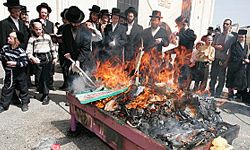For many of us, spring cleaning doesn't have much to do with culture, religion or spirituality. We've been cooped up in our stuffy dwellings all winter, which can be such a downer that we sometimes let the clutter and dust pile up. Now that the weather is warm, flowers are in bloom, and the sun is shining, we emerge from our cold-weather stupor ready to freshen up our caves -- I mean -- homes. But it shouldn't surprise you that the United States doesn't hold a monopoly on spring cleaning.
Our general spring cleaning traditions have their roots in Europe, but in many places around the world, it's about much more than just getting your actual house clean. A top-to-bottom, thorough house cleaning (which, depending on where you live, may not always take place in the spring) is often a tangible representation of changes happening within. Yes, I'm talking about religious or spiritual cleansing. Let's get deep into some of the spring cleaning traditions around the world and their meaning. Maybe you'll think a little differently about your need to tackle those cobwebs!
Advertisement



